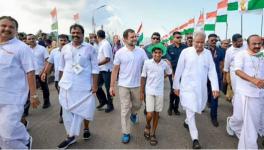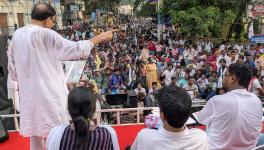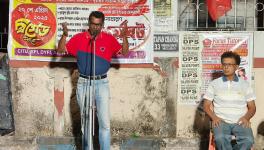‘Gandhi Godse - Ek Yudh’: Are Alternative Narratives Really Possible?
Image Courtesy: Wikimedia Commons
This article is not in the genre of film reviews, as they should be, or are written. Instead, it is a situational review or an assessment of a situation that is now ‘history’ or in the past.
In effect, it is a comment on an imaginary state of affairs that ‘could have been’ our history, but isn’t.
The filmmakers may not have consciously taken a call, but they took the correct one by not being compelled by tradition. Instead of releasing ‘Gandhi Godse - Ek Yudh’ on January 30, 2023 – the 75th anniversary of the assassination of Mahatma Gandhi – as populist logic would have suggested, they chose to raise the curtains on the film in theatres on Republic Day.
This is apt because the film is not so much the retelling of Gandhi’s assassination but is more an examination of the path that could have been taken by the republic, the birth of which Gandhi laboured for, but never saw.
The film is an exploration of a possible path that the Indian nation may have walked on if, by a quirk of fate, the bullets that Nathuram Vinayak Godse pumped into Gandhi had not rendered his body lifeless, and he miraculously continued to live.
At this stage, for the next few lines, there is a need to step away from the film, to the Republic Day, when the film was released. The adoption of the Constitution on this day in 1950 was again celebrated days ago with pomp and show, but more as a ritual than a deeply-felt declaration of commitment to the nation’s constitutionality.
This year’s celebrations were preceded by possibly the most serious challenge to the Constitution since 2014. It was worse because the attack was mounted by the power duo of Vice President, Jagdeep Dhankhar and Union Law Minister, Kiren Rijiju when they questioned the Basic Structure or spirit of the Constitution and began what appears the start of a long-drawn campaign to rubbish the highest institution of the judiciary.
The release of the film with an alternative narrative to actual events on Republic Day was marked by the ‘real’ Gandhian spirit being in short supply, as well as the Indian Republic’s in absentia existence.
Rajkumar Santoshi’s film explores a fictional question – what would have happened if Godse failed in his mission and Gandhi had survived?
How would the Indian people and the State cope with the Bapu who had already become ‘cynical’, if not indifferent, to India’s independence?
And, more importantly, how would Gandhi have responded to India and Indians when hatred for the ‘other’ would have been an integral part of the thinking of a numerically significant group?
How deep was the unstated majoritarian-led antagonism against Gandhi for his perceived ‘softness’ towards Muslims?
Was he actually not considered the Father of the Nation, but seen as the one who fathered the politics of ‘appeasement’?
The film, co-written by well-known writer Asghar Wajahat (he also wrote the dialogues independently), is based on his play ‘[email protected]’. The film embarks on its fictional trajectory on the historically correct foundations of rising communal violence after partition and independence, escalating the trend that started in the early 1940s and especially after 1946.
In that despondent situation, Gandhi attempts to restore sanity by beginning what eventually became his last fast. By then, he had already angered Hindu communal forces by saying that Muslims in India should be protected and their properties must not be thrown open to Hindus and Sikhs arriving from Pakistan.
Amid this air of animosity against him, another matter surfaced and this was seen as an ‘unpardonable’ act. Under the terms of the division of assets and liabilities between India and Pakistan, Rs 75 crore was to be paid by the Indian government, and it paid Rs 20 crore to Pakistan right away.
However, because of developments over Kashmir, the Indian government held the balance of Rs 55 cr back, a decision that Lord Mountbatten considered morally and politically wrong. He communicated this to Gandhi, who agreed because he saw the hold-back decision as absolutely unethical.
Although in Gandhi’s original declaration of the fast, there was no reference to expedite the release of Pakistan's share of financial assets, this was added to the list of ‘demands’ to end the fast.
The GoI announced its decision to release the amount but Gandhi remained on fast till leaders of all communities and major organisations publicly pledged to stop riots and restore the damaged Islamic places of worship.
The film is also true to history in that Godse states his ‘case’ elaborately in his defence statement on what motivated him to assassinate Gandhi. The difference, however, in truth and fiction is that in the film, Gandhi is alive when Godse makes that statement.
The rest of the film is the result of Wajahat’s creative license and he gives his perspective on what would have happened if Gandhi had lived through the trauma.
Would Gandhi have ‘pardoned’ Godse the way he is shown to have? Would Godse have been so steadfast in his commitment to the ideology of hate and remained a prisoner of his Islamophobic thinking?
Would Gandhi have actually quit the Congress and go on to ‘chase’ his dreams of flourishing Gram Swaraj in the rural hinterland of India, far removed from the centre of polity?
Would Gandhi have become a ‘burden’ and ‘hindrance’ to the leaders of independent India’s first government, as is suggested in the film?
These are all scenarios that the film stimulates us to visualise and consider. In the film, Gandhi is shown as continuing to do what he did in colonial India – inspire the lowest denominators of society to raise their voice against exploitative laws and manipulative money-bags and traders.
For Gandhi, every battle is still a battle against the imprisonment of people’s needs and desires.
The situation leaves the government with no other option than charging Gandhi of the same crime that nationalists were accused of before 1947: treason – under the same Indian Penal Code that is still law in India after 75 years of ‘freedom’!
Thereafter it is Gandhi’s insistence to be placed in the same jail and ward as Godse, for the rest of film to proceed.
The script ‘resolves’ the Gandhi-Godse conflict with both somewhat seeing the other’s point and being able to spot the shortcoming within. It is idyllic to see the camaraderie between the two walking out of jail, almost hand in hand, flanked by files of their supporters shouting slogans at one another.
There is hope that the flanks would have thinned and India would have left a primary cause of discord behind and head into a hopeful future.
But have they? At least the ones on the right flank? Will Hindutvadis watch this film and decide that it is time to put curtains on their venomous hate campaign?
Even before the thought of the writer’s naiveté, or optimism, could become a well-formed thesis in mind, conversations among those walking out of the theatre ruled out the possibility of India emerging from the darkness of communalism’s shadow.
“The film was too soft towards Gandhi,” said another. The other took the cue: “Godse was not such vicharon ka kachcha (unsure of his views).”
Godse may have chosen to assassinate Gandhi in order to seek immortality. But by then Gandhi had already become a giant and even if he has died by non-violent means, the world would have still uttered Albert Einstein’s etched on the mind words: “Generations to come will scarce believe that such a one as this ever in flesh and blood walked upon this earth.”
However much one can allow Wajahat the use of his creative license, we need to understand that Godse was not competent and high-up in the hierarchy to ‘resolve’ what was a fundamental divergence in how Indians saw the nation and their nationhood.
Gandhi carried moral clout within the fraternity that saw India as an inclusive society where minorities had an equal right to protection.
Godse was just a mere foot-soldier of an ideological clan and was propped up by the support of the likes of VD Savarkar and MS Golwalkar.
There was nothing shadowy about Gandhi’s activities. In contrast, Godse belonged to a political community which was addicted to use of subterfuge.
Gandhi’s public life was raised on the principles of non-violence, while the ‘Savakarite’ Godse believed humans were inherently violent and considered violence as being perfectly justified.
Films like this provide an escape from reality. But this ‘retreat’ may end right in the parking lot by scrutinising people making a beeline for the exit door – after all, there’s a next one to either catch or vent against. After all, Pathan was released just a day before.
Wajahat and Santoshi succeed by giving all shades of opinion some takeaways. But that is not how history deemed it.
Yet, this is an important film for giving one the mind space and time to examine if alternative narratives are possible for India.
But, in the India of the present, no utopia can be reached by staging a dialogue between two individuals or even a handful.
To emerge out of the black hole that is today’s India, one requires more than one Gandhi to mobilise people and give them strength.
Each of these Gandhis have to do more than what the ‘fictional’ one did in the film, shortly after ‘regaining’ life, forsaking all power and heading to where the real power of the country lies: its people.
Nilanjan Mukhopadhyay is a NCR-based author and journalist. His last book was The Demolition and the Verdict: Ayodhya and the Project to Reconfigure India. He has also written The RSS: Icons of the Indian Right and Narendra Modi: The Man, The Times. He tweets at @NilanjanUdwin. The views are personal.
Get the latest reports & analysis with people's perspective on Protests, movements & deep analytical videos, discussions of the current affairs in your Telegram app. Subscribe to NewsClick's Telegram channel & get Real-Time updates on stories, as they get published on our website.























